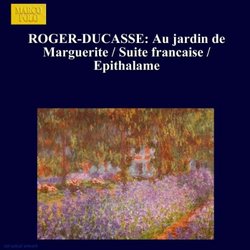Exquisite, refined, delicate music with a tad of nostalgy
cdg@hondutel.hn | Tegucigalpa, Honduras | 12/02/1998
(5 out of 5 stars)
"Roger-Ducasse, same as Louis Aubert and many others were infortunate: they were born at the same time and place of Debussy and Ravel. Under other circumstances, they would have been celebrities. The music is exquisite, delicate, refined."
Gorgeous
G.D. | Norway | 09/28/2009
(5 out of 5 stars)
"The two recordings of orchestral music by Jean Roger-Ducasse (1873-1954) from The Rheinland-Pfalz Philharmonic under Leif Segerstam are truly invaluable additions to the catalogue, and for those new to the composer I would recommend starting with this one, insofar as it contains the better music and even slightly better performances. This extremely self-critical composer left a rather small body of works (destroying many of his compositions himself), and had a penchant for the unpopular and difficult. Thus many of his works are rather dense and somewhat difficult to follow structurally - although probably not difficult by modern standards - but immensely rewarding. Of course, the music might be appreciated at a more superficial level as well, with its intoxicatingly perfumed lush and luxuriant orchestral textures. Stylistically, Roger-Ducasse might be the closest you come to the orchestral music of Debussy (there are more than a few touches of Fauré, and perhaps Chausson and even Massenet), and if you like Debussy I am pretty sure you'll like Roger-Ducasse.
Au jardin de Marguerite was composed between 1901 and 1905 and is heavily indebted to Debussy's L'apres; it is a stunningly intoxicating work, however, lushly and luxuriantly scored, almost fragrant and immensely atmospheric. You can almost literally smell the flowers, feel the heat and hear the chirping of birds. The Suite Francaise dates from 1909 and is another immensely appealing work, generally impressionistic but with noticeable touches of Fauré and perhaps d'Indy. Again, it is splendidly scored and very effective, with the opening overture being a particularly memorable creation with its strikingly characteristic descending four-note theme. The main work on the disc, however, is Epithalame, a large-scale symphonic poem incorporating `modern' dance forms into a genuinely symphonic structure. The sections are adagio, cake-walk, fox-trot, tango, danse finale, adagio, and Roger-Ducasse weaves them together imaginatively, relying heavily on wonderful orchestral touches, but employing some really distinctive themes developed into a convincing whole. The short Prélude d'un Ballet is less memorable but effective enough.
In other words, this disc contains a rich selection of effective, often beautiful and extremely well-crafted music of real merit, richly varied and often enchantingly atmospheric and beautiful. Since it relies heavily on orchestral colors and textures, it demands a lot from the performer, and although better performances might indeed be imaginable the performances here are quite good, and superior to the ones on the first installment; sensitive and variegated and with Segerstam having a firm grasp of the musical arguments. The sound quality is good (a little murky, perhaps, but nothing really to complain about), and I won't hesitate to recommend this disc with utter enthusiasm; I cannot imagine anyone being disappointed with it, and it is unfortunate that little more of Roger-Ducasse's output is generally available (there are enough orchestral or choral and orchestral works to fill another disc, I think); in particular, a perfect world would have given us a recording of his main work, the opera Cantegril - it does require something in the vicinity of 32 distinct soloists, however, so I have little hope of ever hearing it. Still, I am grateful for what we've in fact got here."


 Track Listings (7) - Disc #1
Track Listings (7) - Disc #1